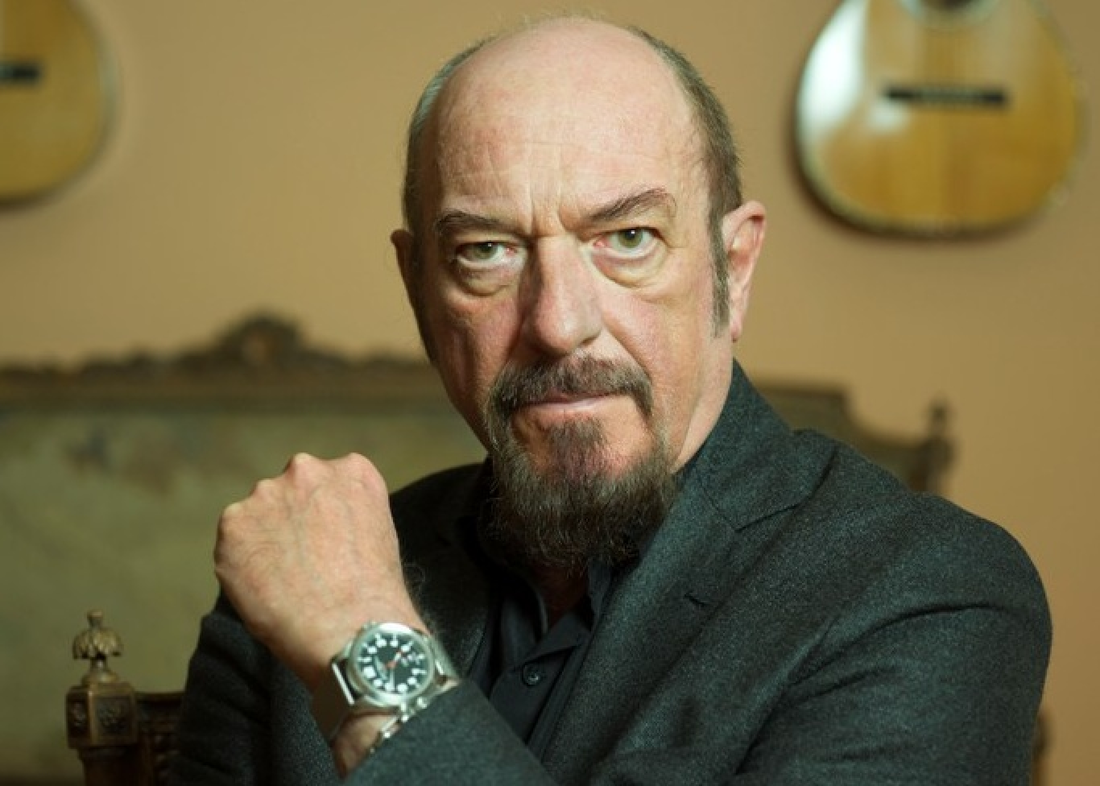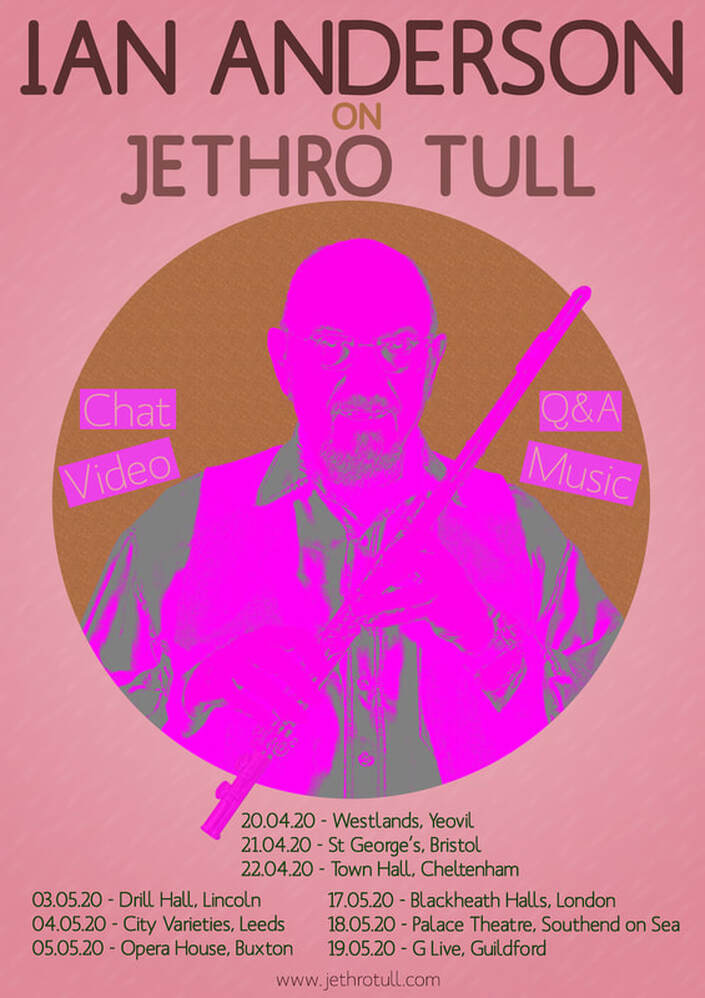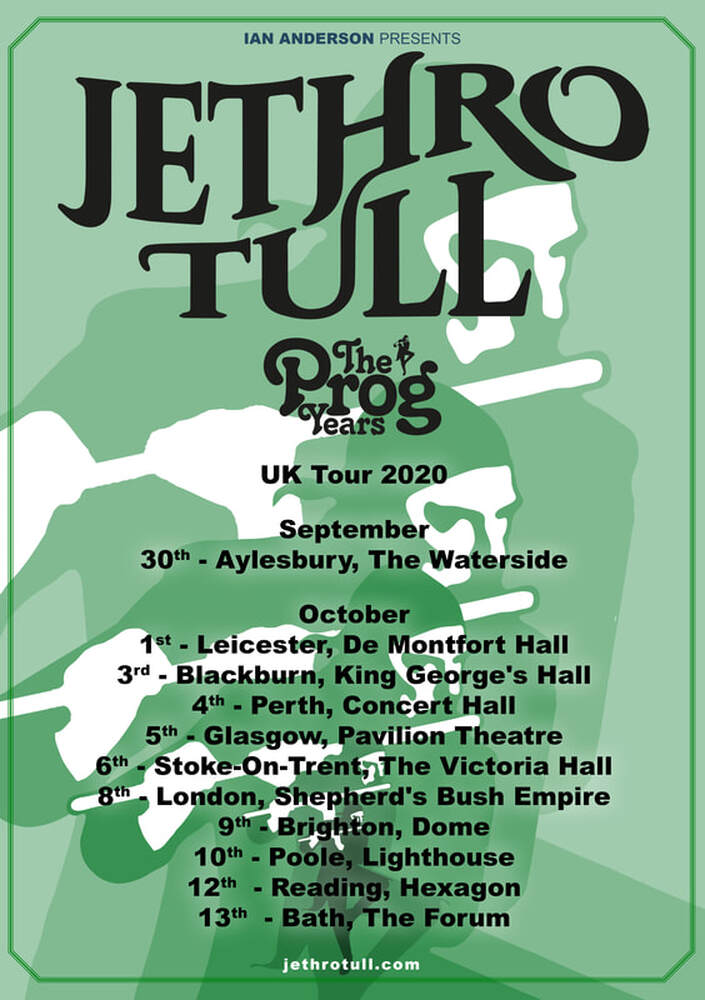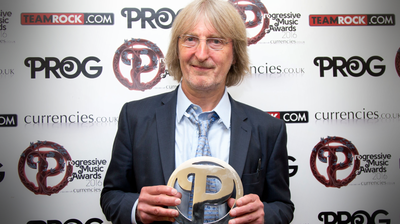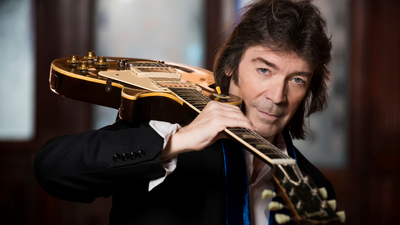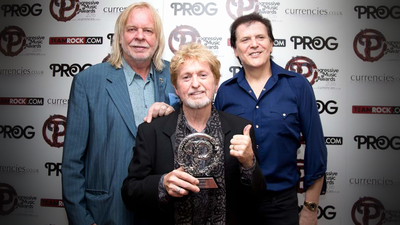|
Things are never quiet in Ian Anderson's world, but of late he's been particularly busy, so busy in fact, that even the release of his long awaited next album has lapsed. "The reality is that yet again, I had January and February set aside for working to complete the new album, and that has just disappeared", he tells us as we sit down for a chat. Still, there's a new live production celebrating Jethro Tull's 'Prog Years' (of which there were many) to look forward to, as well as an intimate 'an evening with' set of events to look forward to. We caught up with the Prog God for a chat about what's going on in 2020. Minstrel in the gallery; Eamon O’Neill.
Hi Ian, how are you today?
I’m not entirely compos mentis this morning, having spent the last 72 hours in intense rehearsals with the band. We’re all a bit knackered. Is that for the forthcoming ‘The Prog Years’ shows? It is indeed. It’s running everything; the video, and all the cues with our lighting director. To a large extent, the members of the band, they all prepare everything beforehand; they all have the resources in terms of music references and descriptive things that I can provide everybody with, but when we all actually still need to come together, particularly when it’s involving a more production-oriented situation with synced video and so on. It becomes necessary to spend quite a bit of time doing that. Before that, you’ve got your more intimate ‘Ian Anderson on Jethro Tull’ shows happening. That’s what we were doing for the production tour in October in the UK, and then in April / May, it’s just a more intimate, theatre, Jethro Tull-oriented chat. There will be music performances, but that’s just me with my guitar player Joe [Parrish], who has yet to perform his first concert, a week on Friday. So you’re easing the new player in with these more laid back shows? Not really, now, because we start a week on Friday in Barcelona with the Jethro Tull production tour, so we have several places to visit before we do the more intimate q&a type shows. Between now and then we do a bunch of places that we will be able to continue to develop the show in. We’re in Spain, and then in Finland, and Italy and Poland and Russia, so we have lots of shows to do. Is that a different type of show again? Yes. There’s something about changing the format of the show, which happens about three or four times a year; it’s quite energising, because you find yourself really looking forward to the Christmas concerts, because you haven’t played that type of set for twelve months, and then it’s time to ease that material back in again, and it’s always a lot of fun knowing that you have something other than week upon week, month upon month, repetition of the same set list, which, in some ways provides its own blue blanket comfort zone, but then you have to meet the challenge of; “oh my god, I’ve a completely different show to play tomorrow night!” Going back to the theatre shows, and are you reprising the format of your 2002 / 2003 ‘Rubbing Elbows With’ American tour?
That was very much based on the American TV talk show format, so I had guests and I interviewed people as well as it becoming a bit of dual banter with the co-presenter from local radio. So it had a format that was something that, at that time, wouldn’t have so easily translated into the UK, so I never did that kind of a show in the UK, or obviously for language reasons, any other country like mainland Europe. So, this is more interactive in the sense that there will be opportunities for members of the audience to take on the role of Andrew Neil pinning down the missing Boris Johnson! I’ll be Boris; you can take me to task, watch me squirm, and watch me try to wriggle out of it if it’s an embarrassing or hard question! But I think that’s fun for me, and fun for them. What else does the show have in store? Well, we’ll do a bit of that, and of course there’ll be lots of illustrations behind me on video of the early days of Jethro Tull and people I’ve worked with. It’s definitely a piece of entertainment for people who would consider themselves fairly knowledgeable fans of Jethro Tull. I haven’t got the set list in front of me, but there will probably be twelve or thirteen pieces of music that we’ll be playing during the evening with obviously a very stripped-down and edited format. But none the less, it’s really about giving the idea of how these songs came about; the song writing process, the elements of melody and harmony, and some of the instruments. So Joe and I will be playing lots of things; some of which will sound not too different to the original recorded version, or they’ll be a little bit more elementary in their context and arrangements. It’s for the Tull fans; it’s an intimate kind of a thing that probably will not be appealing to somebody that knows nothing about Jethro Tull. Have you any concerns at all that you’ll get questions that you don’t want to answer, or are you looking forward to seeing what comes up? Oh, I’m very much looking forward to it! You know, the worst thing that’s going to happen is someone’s going to ask me something, and I‘ll say; “oh, I can’t remember anything about that!” Or; “oh, that never happened”. They could be recipients of false information they’ve gleaned from the internet, and I will be quick to point out that while Mr. Google is an endless source of amusement and fun, as indeed is his second-cousin Mr. Wiki, we can’t always believe what we read. Have you found that in the past, that erroneous stories get repeated? Some things do get endlessly copied and pasted, and they’re based on some sort of folklore-ish or even scurrilous untruth in the first place. So when people ask me about my “feud” with Robert Plant, then they can expect a sharp retort, because there was never a feud between me and Robert Plant; it’s one of these absurd things that seems to come up. I had no idea that was even a thing! I remember meeting Robert Plant, and he said; “I hope we can put that behind us”, and I said; “what?”, and he said; “whatever it as we are supposed to be feuding about”, and I said; “exactly!” We never had a feud, because we didn’t really communicate. Led Zeppelin were Led Zeppelin; they were rock gods, and we were the humble support act. We rarely spoke, particularly to Robert, who was on a higher plane, as a vocalist, and as a person. Jimmy Page was a little bit more friendly, but Bonham, you steered a mile away from, because he was a raving nutcase! He was always polite enough to me, but I probably just saw him on a rare good mood. I think to some extent, the stories of Led Zeppelin being hell raisers who barged their way across America, there is an absolute element of truth about it, but probably wildly exaggerated. You were contemporaries of Led Zeppelin, none the less. Well, Led Zeppelin, like Jethro Tull began really, with a background in essentially, black American blues, but clearly it was in the song writing of Page and Plant, that it moved towards something that has every right to be called progressive rock. I don’t think it was a term usually applied to Zeppelin because they were in a world of their own, much of the time. But looking back at it, there’s a lot of their work – things like ‘Kashmir’ – things that are very clever, quite complicated progressive rock ideas, taking elements of rhythm and melody that were quite often deriving in influence-terms from other cultures, other music styles. And so Zeppelin had, rather like Jethro Tull after the first album anyway, a very eclectic mind of musical taste and musical influence. Both Jethro Tull and Led Zeppelin shared a love of Roy Harper, among other things.
Of course, Roy Harper, amongst the various people that came across him back then; a couple of members of Zeppelin, a couple of members of Pink Floyd, and one member of Jethro Tull; we had an affinity with Roy, we played on his records or whatever, so yes, there was a bit of a symbiotic relationship there. I guess, it’s rather like Jimi Hendrix, if he were alive today, he would be the king of progressive rock, because that’s the only thing you could call his music. It didn’t perhaps go into the more scholarly or academic side of music in the way that perhaps Emmerson, Lake and Palmer or even Yes, in a way, but none the less it was still taking music away and beyond the thing that it began being in the era when rock music came out of; essentially black American blues and Jazz. In the days of early Elvis, rock music was something that essentially, was about three or four minute pop songs, simple stuff, but progressive is about taking ideas forward. Of course a lot of self-indulgent, anally-obsessive meandering went on, but you’ve got to take a few wrong paths in a maze in order to find your way successfully to the exit. I think that’s probably true of all of us. I think a thing that most progressive or prog rock musicians have in common is a low boredom threshold, and that defines essentially what progressive rock is about. We get bored with doing something that seems too much dependent on what went before. We want to try and move onwards and put our own stamp on the music; even if it’s more of a muddy footprint than a delicate imprint on the lunar surface. Jethro Tull had huge success when prog was at its height in the ‘70s, but a lot changed as the new decade arrived; did the band struggle to fit in?
Well on the inside, we didn’t struggle at all. We were quite impassioned and moving to the next thing, but more or less in cheerful oblivion of what else was going on in the music, which was the ‘80s; it was synth-pop; it was Marc Almond; it was Gary Numan, and although I wasn’t enamoured with the music when it came about, I’ve since come around to the idea that this was another great decade of British music that exported itself around the world and showed the independence and the creativity of another generation of younger musicians. Marc Almond was a fan of Jethro Tull and progressive music. Marc has recently turned 60, and I was a guest at his concert at the Royal Festival Hall a couple of weeks ago; “I was 13 when I heard this song, ‘The Witches Promise” [mimicking a nervous Marc Almond talking to the audience], and he was so nervous about getting up and playing one of our songs! It was very endearing! You forget that music is passed on like a baton in a relay race, just as I, in some ways inherited the music of anything from Muddy Waters to Beethoven, so did people like Marc Almond inherit some of the early efforts of Jethro Tull. As indeed did the Sex Pistols did; Johnny Rotten was a bit of a fan of the ‘Aqualung’ album, not that of course he would have admitted to it at the time. If he had, then Malcolm McLaren would have probably fired him from the band for sullying their reputation and their public image! Finally, you’ve been hinting that new Ian Anderson music is forthcoming for the last year or so; have you any update on how that’s progressing? Well, this interview might have concluded with me saying; “yeah, I’ve just finished the last mixes of the new album!”, but the reality is that yet again, I had January and February set aside for working to complete the new album, and that has just disappeared, day after day with the various other things that can’t wait that I just have to get on with. I think that Christmas Day was my only day off! I’ve been working every day since about that time last year, and whilst I have some completed, finished mixed songs, I still have a few that need to be completed, and another five tracks to record, which are all written, and in a sense ready to roll and get on with. But it is finding the free days with my schedule to be able to do that. So, I can confidently predict that sometime in the next 10 years, this album will be released! [*laughing*] Can you give us a hint of what direction it’s taking? It’s another of those albums that is loosely defined as being ‘progressive rock’; it’s a thematic, conceptual album that has, I think, quite carefully considered lyrical references. But giving the game away saying; “well, this is what it’s about”, it rather takes the fun out of it for people who are going to look behind the lyrics and see what is the common thread. If I read novel or see a movie, I don’t want everything laid out in front of me; I want to be challenged a little bit and contemplate stuff and come up with my own considered evaluation; I don’t want it all presented on a plate. Like this interview? Like us on FaceBook and follow us on Twitter for regular updates & more of the same. Ian Anderson's 'On Jethro Tull' theatre tour kicks off on 20th April 2020 in Yeovil. Jethro Tull's 'The Prog Years' run begins in Aylesbury on 20th September 2020. For a full list of dates, visit jethrotull.com. |
|
Jethro Tull
"A thing that most progressive rock musicians have in common is a low boredom threshold, and that defines essentially what progressive rock is about". - Ian Anderson.
© 2016 - 2024 eonmusic.co.ukContact: [email protected]
|


